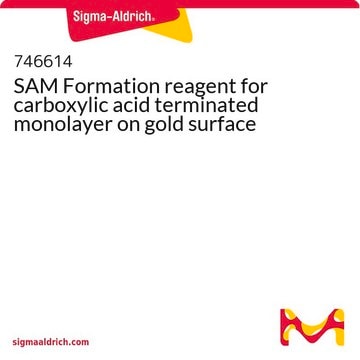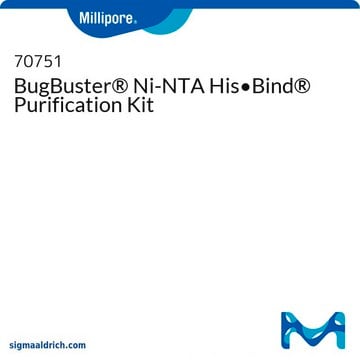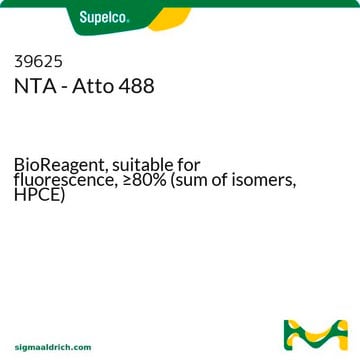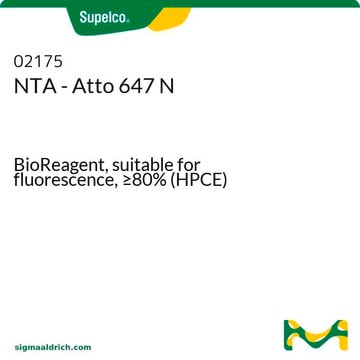792438
NTA terminal-SAM formation reagent
Synonym(s):
NTA-SAM, Nitrilotriacetic acid SAM
Sign Into View Organizational & Contract Pricing
All Photos(1)
About This Item
UNSPSC Code:
12352103
NACRES:
NA.23
Recommended Products
General description
3 units of 2 μmol product per set.
Application
Used for the preparation of nitrilotriacetic acid (NTA) -terminated self-assembled monolayers (SAMs) on gold surfaces as biosensors detected by SPR (Surface Plasmon Resonance)
Preparation Note
Suggested method for the preparation of NTA-SAM surface on a gold substrate.
1. Add 1ml of ethanol to a tube; and pipette to dissolve the reagent to prepare 2 mmol/L NTA-SAM solution. Dilute the solution 10-fold with ethanol for the next step.
2. Clean a gold surface of a substrate with Piranha solution prior to preparing NTA-SAM. Immerse the substrate in the prepared reagent solution and incubate overnight at room temperature.
3. Wash the substrate several times with ethanol and purified water sequentially.
1. Add 1ml of ethanol to a tube; and pipette to dissolve the reagent to prepare 2 mmol/L NTA-SAM solution. Dilute the solution 10-fold with ethanol for the next step.
2. Clean a gold surface of a substrate with Piranha solution prior to preparing NTA-SAM. Immerse the substrate in the prepared reagent solution and incubate overnight at room temperature.
3. Wash the substrate several times with ethanol and purified water sequentially.
Signal Word
Warning
Hazard Statements
Precautionary Statements
Hazard Classifications
Eye Irrit. 2 - Skin Irrit. 2 - STOT SE 3
Target Organs
Respiratory system
Storage Class Code
11 - Combustible Solids
WGK
WGK 3
Flash Point(F)
Not applicable
Flash Point(C)
Not applicable
Certificates of Analysis (COA)
Search for Certificates of Analysis (COA) by entering the products Lot/Batch Number. Lot and Batch Numbers can be found on a product’s label following the words ‘Lot’ or ‘Batch’.
Already Own This Product?
Find documentation for the products that you have recently purchased in the Document Library.
Customers Also Viewed
Ismael Plaza-Ga et al.
Journal of nanobiotechnology, 17(1), 108-108 (2019-10-19)
A major bottleneck in drug delivery is the breakdown and degradation of the delivery system through the endosomal/lysosomal network of the host cell, hampering the correct delivery of the drug of interest. In nature, the bacterial pathogen Listeria monocytogenes has
Our team of scientists has experience in all areas of research including Life Science, Material Science, Chemical Synthesis, Chromatography, Analytical and many others.
Contact Technical Service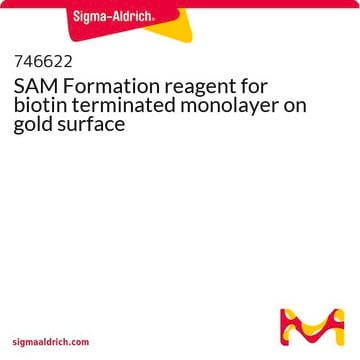
![N-[Nα,Nα-Bis(carboxymethyl)-L-lysine]-12-mercaptododecanamide ≥90.0% (TLC)](/deepweb/assets/sigmaaldrich/product/structures/421/384/d2cb2cfc-59fa-44f9-832b-65e9af62ebaf/640/d2cb2cfc-59fa-44f9-832b-65e9af62ebaf.png)
